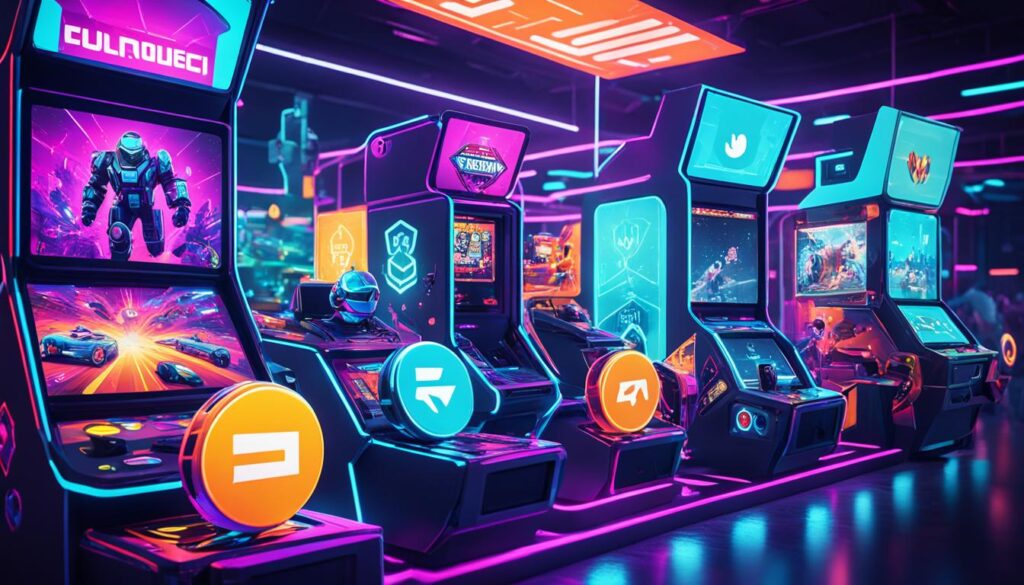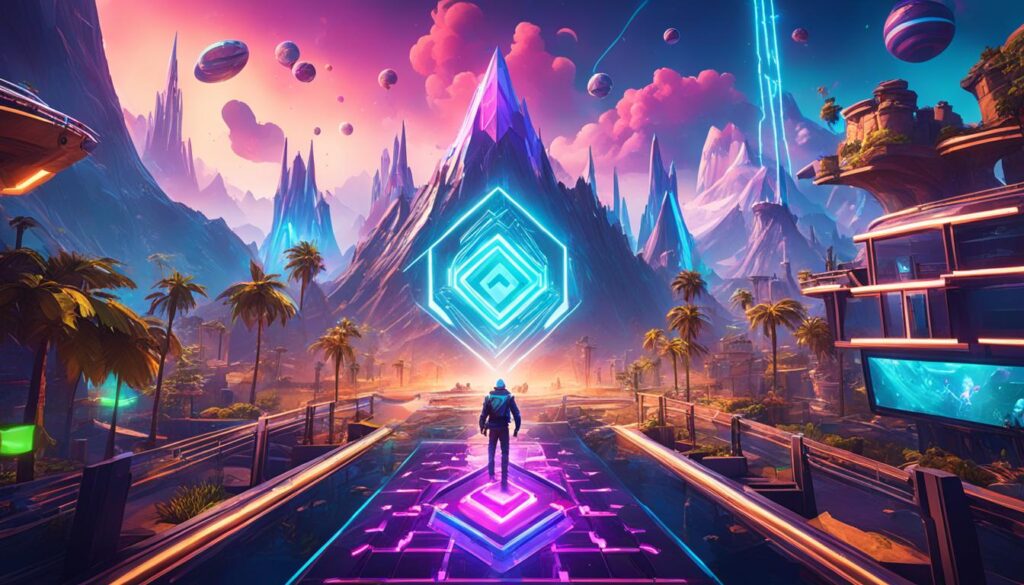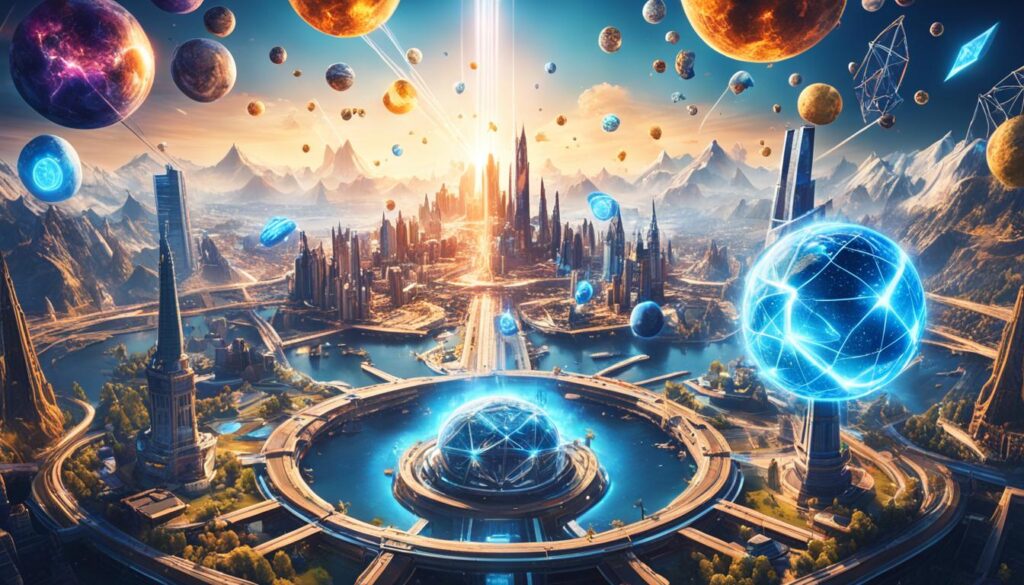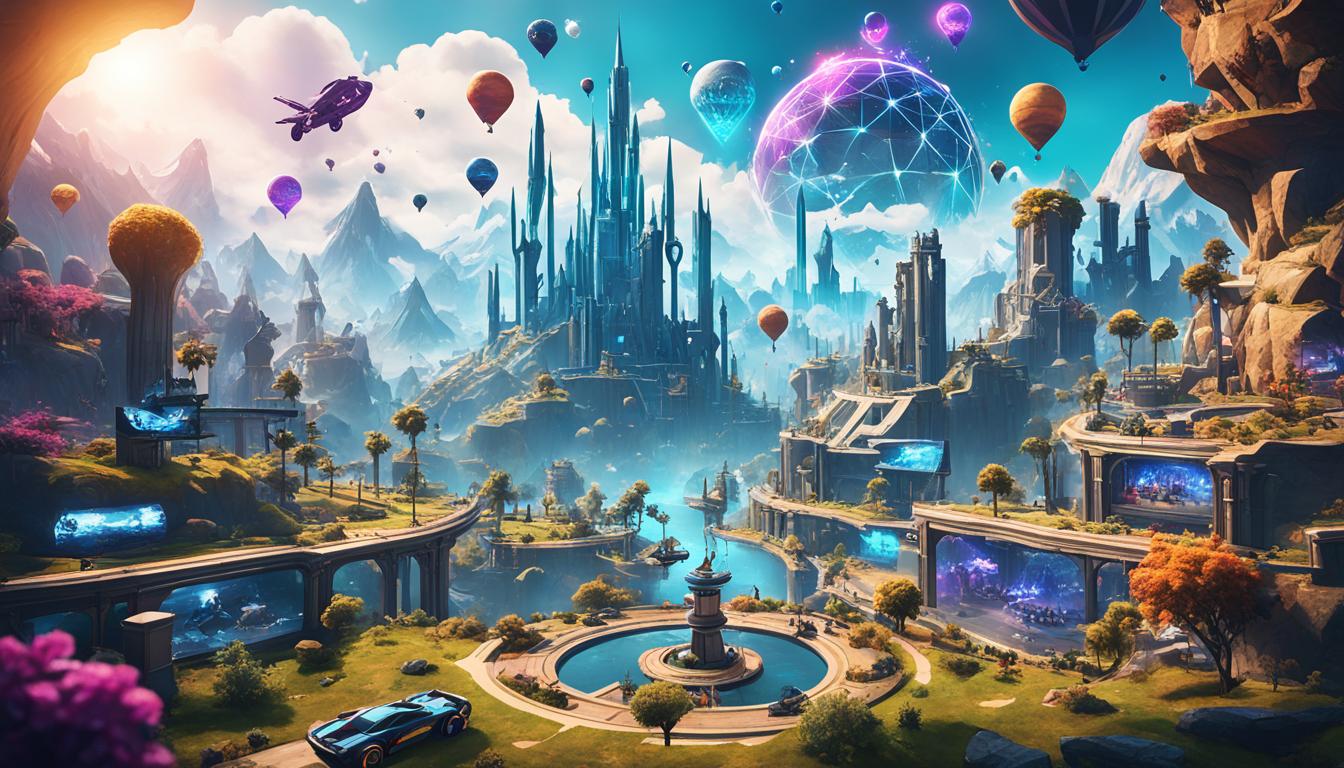The gaming industry is undergoing a profound transformation with the advent of Web 3.0 and decentralized economies. Web 3.0, powered by blockchain technology, is revolutionizing the internet and reshaping the gaming landscape. This evolution brings about new innovations that emphasize user control, ownership, and a trustless environment.
Key Takeaways
- Web 3.0 is transforming the gaming industry with decentralized economies.
- Gaming industry is experiencing a significant transformation.
- Decentralized economies are having a profound impact on the gaming industry.
- Web 3.0 gaming innovations are revolutionizing the way games are developed and played.
- Web 3.0 introduces user control, ownership, and a trustless environment in gaming.
Web 3.0 gaming represents a paradigm shift from traditional gaming models. It introduces decentralized applications (dApps) and Non-Fungible Tokens (NFTs) to the gaming ecosystem. These innovations enable gamers to have true ownership of in-game assets, trade them freely across games and platforms, and even earn real-world value through play-to-earn models.
Web3 Gaming: A Paradigm Shift
The gaming industry is undergoing a remarkable transformation with the advent of Web3 technologies. This new era of gaming, powered by blockchain and decentralized applications (dApps), is revolutionizing the way gamers interact with virtual worlds. Web3 gaming brings a paradigm shift from traditional models, paving the way for true ownership, cross-platform asset trading, and play-to-earn mechanics.
With the introduction of Non-Fungible Tokens (NFTs), gamers can now have unprecedented control over their in-game assets. These unique digital tokens enable players to prove ownership, trade rare items, and even earn real-world value from their virtual endeavors. The concept of ownership in Web3 gaming goes beyond the boundaries of a single game, allowing players to freely transfer assets across different games and platforms.
The play-to-earn model has gained significant traction in the gaming industry, thanks to Web3 innovations. By participating in certain games, players can earn cryptocurrencies that can be exchanged for real-world value. This shift in the gaming economy empowers players to monetize their skills and time spent in virtual worlds, creating new opportunities for gamers around the globe.
One of the pioneers of this new gaming landscape is Axie Infinity, a blockchain-based game that merges NFTs and play-to-earn mechanics. Players breed and battle creatures called Axies, with the ability to earn income by selling or trading these digital assets. Axie Infinity has gained immense popularity, generating substantial earnings for players and showcasing the potential of Web3 gaming.
Web3 gaming not only revolutionizes ownership and earning potential but also fosters a more inclusive and collaborative community. Decentralized Autonomous Organizations (DAOs) are emerging as powerful forces within the Web3 gaming ecosystem. These organizations allow players to have a say in the development and governance of games, enabling a democratic and user-centric approach to game design and implementation.
As Web3 gaming continues to evolve, it brings forth unparalleled security and transparency. The implementation of blockchain technology ensures the immutability of in-game transactions and mitigates risks associated with centralized control. With every transaction recorded on the blockchain, players can trust that their virtual assets are secure and transparent.
“Web3 gaming represents a major leap forward in the evolution of the gaming industry. It introduces new possibilities for ownership, earning, and community engagement. This paradigm shift challenges traditional gaming models, creating a more empowering and inclusive gaming experience for players worldwide.”
In summary, Web3 gaming is redefining the gaming industry by offering a decentralized, fair, and transparent gaming environment. The integration of decentralized applications, NFTs, play-to-earn models, and DAOs brings forth exciting opportunities for gamers and developers alike. This evolution represents a promising future where players have greater control, ownership, and economic agency within virtual worlds.
Gaming Industry Evolution: Web3 Key Features and Advancements
- True ownership of in-game assets
- Seamless cross-platform asset trading
- Earning real-world value through play-to-earn models
- Decentralized Autonomous Organizations (DAOs) for community-driven development and governance
- Enhanced security and transparency powered by blockchain
Let’s take a closer look at the key features and advancements that define the evolution of the gaming industry in the Web3 era:
| Advancement | Description |
|---|---|
| True ownership of in-game assets | Web3 gaming enables players to have full ownership of their in-game assets through the use of Non-Fungible Tokens (NFTs). These unique digital tokens are stored on the blockchain, ensuring provable ownership and the ability to freely transfer, trade, and monetize assets. |
| Seamless cross-platform asset trading | With Web3 gaming, players can trade their assets seamlessly across different games and platforms. The interoperability of NFTs allows for a vibrant and interconnected gaming ecosystem, where players can explore new virtual worlds and extend the value of their assets. |
| Earning real-world value through play-to-earn models | Play-to-earn models have emerged as a game-changer in the gaming industry. Through Web3 gaming, players can earn cryptocurrencies and other real-world value by actively participating in games. This empowers players to monetize their gaming skills and create tangible economic opportunities. |
| Decentralized Autonomous Organizations (DAOs) for community-driven development and governance | DAOs play a crucial role in Web3 gaming, allowing players to actively participate in the development and governance of games. Through community-driven decision-making processes, DAOs create a more democratic and user-centric approach to game design, fostering a stronger connection between developers and players. |
| Enhanced security and transparency powered by blockchain | The integration of blockchain technology enhances the security and transparency of Web3 gaming. Transactions recorded on the blockchain are secure, immutable, and transparent, mitigating the risks of fraud, theft, and centralized control. Players can have confidence in the integrity of their virtual assets and the fairness of the gaming ecosystem. |
The evolution of the gaming industry through Web3 technologies holds immense potential for gamers, developers, and the gaming community as a whole. As we embrace this paradigm shift, we embark on a new era of gaming that is inclusive, empowering, and built on the principles of decentralization.

The Rise of Play-to-Earn Models
Play-to-earn models are revolutionizing the gaming industry, paving the way for a promising future of the gaming economy and decentralized gaming platforms. These models offer gamers a unique opportunity to earn cryptocurrencies by actively participating in games, creating a more inclusive and equitable gaming landscape.
One notable pioneer of the play-to-earn model is Axie Infinity, a blockchain-based game that allows players to breed and trade virtual pets called Axies. By engaging with the game and breeding Axies, players can earn substantial income in cryptocurrencies. This innovative concept has captured the attention of gamers and investors alike, showcasing the immense potential of play-to-earn models in revolutionizing the gaming experience.
Play-to-earn models democratize the gaming industry, providing economic opportunities to a global user base. They empower gamers to leverage their skills and in-game achievements to generate income, blurring the lines between gaming and real-world value creation. By embracing decentralization and blockchain technology, these models foster a trustless environment where gamers can trade and monetize their virtual assets freely.
Play-to-earn models bring new meaning to the concept of gaming, transforming it into a viable economic activity that benefits players from all walks of life. They bridge the gap between virtual worlds and tangible rewards, creating an ecosystem where gamers can thrive and prosper.
As decentralized gaming platforms continue to emerge, the future of the gaming economy holds tremendous potential. By embracing play-to-earn models, gamers become active participants in shaping the industry, with their actions directly influencing the virtual economies they inhabit. This paradigm shift marks a new era where gaming is no longer solely recreational but a path to financial empowerment and independence.
Key Benefits of Play-to-Earn Models in Gaming
| Benefits | Description |
|---|---|
| Financial Inclusion | Enables gamers worldwide to earn income and participate in the global economy. |
| True Ownership | Gives gamers full control and ownership over their virtual assets, allowing them to freely trade and monetize. |
| Empowering Players | Provides a platform for gamers to showcase their skills, creativity, and dedication, with rewards proportional to their efforts. |
| Economic Opportunities | Opens doors to the creation of new job roles and careers within the gaming ecosystem. |
| Community Driven | Fosters a collaborative environment where players can actively contribute to the development and governance of gaming platforms. |
NFTs: True Ownership and Interoperability
Non-Fungible Tokens (NFTs) are revolutionizing the concept of ownership in gaming. These unique, indivisible digital assets are powered by blockchain technology, providing gamers with unprecedented control and verifiable ownership of their in-game items.
With NFTs, gamers can buy, sell, and trade their virtual assets securely and transparently, without the need for intermediaries or centralized platforms. This introduces a new level of freedom and autonomy, allowing players to truly own their digital possessions.
But the impact of NFTs in gaming goes beyond ownership. The interoperability of NFTs allows players to use their assets across different games, creating a collaborative and interconnected gaming ecosystem. Gamers can take their hard-earned items from one game and utilize them in another, enhancing their gaming experience and increasing the value of their digital collections.
For example, a rare sword earned in a fantasy RPG can be transferred and used in a different game, providing its owner with a competitive advantage or unique abilities in the new virtual world. This interoperability not only enriches the gameplay but also promotes cross-game interactions and fosters a sense of community among players.
Furthermore, NFTs enable developers to create a thriving secondary market for in-game assets. This market allows gamers to monetize their skills and time spent in the virtual world, turning their passion into a source of income. With the rise of play-to-earn models, players can earn real-world value through the buying, selling, and trading of NFTs, unlocking new economic opportunities within decentralized gaming economies.

“NFTs are transforming the landscape of gaming, empowering players with true ownership and the ability to connect their virtual worlds. The interoperability of these assets creates a dynamic and collaborative environment, where gamers can unleash their creativity and explore new horizons.”
Decentralized Autonomous Organizations (DAOs) in Gaming
As the gaming industry embraces the transformative power of Web3 technologies, Decentralized Autonomous Organizations (DAOs) are emerging as crucial elements in driving the future of the gaming economy. DAOs enable community-driven development and governance, empowering gamers to actively participate in decision-making processes and fostering a more democratic and user-centric approach to game design and implementation.
DAOs revolutionize the traditional hierarchical structure found in traditional game development studios by putting the power in the hands of the community. Through the use of blockchain technology, DAOs enable gamers to have a direct say in the development of their favorite games, ensuring that their needs and preferences are taken into account.
One notable example of the impact of DAOs in gaming is the widely popular online role-playing game, Decentraland. In Decentraland, players collectively govern the virtual world through the DAO called Genesis City. This governance structure allows users to vote on proposals, shape the direction of the platform, and even earn rewards for their active participation.
“DAOs in gaming empower the community, allowing gamers to shape the future of their favorite games and have a direct impact on the gaming economy.”
The decentralized nature of DAOs also enhances transparency and trust within the gaming ecosystem. By leveraging smart contracts and blockchain technology, DAOs ensure that decision-making processes are recorded on the blockchain and cannot be tampered with. This transparency fosters a sense of trust among players and developers, positively impacting the gaming economy as a whole.
Furthermore, DAOs pave the way for innovative monetization models that benefit both gamers and developers. Play-to-earn models, powered by DAOs, enable players to earn in-game rewards, tokens, or cryptocurrencies by actively participating in gameplay and contributing to the growth of the gaming ecosystem. This incentivizes engagement and drives the adoption of decentralized economies, creating a more sustainable and inclusive gaming economy.
Benefits of DAOs in Web3 Gaming:
- Community-driven development and governance
- Increased transparency and trust
- Innovative monetization models
- Inclusive and sustainable gaming economy
In conclusion, DAOs are playing a pivotal role in shaping the future of the gaming economy. By giving power to the community and leveraging the decentralized nature of blockchain technology, DAOs enable a more democratic, transparent, and user-centric gaming experience. As the gaming industry continues to evolve, we can expect DAOs to further revolutionize game development and redefine the relationship between players and developers.

Blockchain: Enhancing Security and Transparency
Blockchain technology is revolutionizing the gaming industry by enhancing security and transparency. As a decentralized and distributed ledger, blockchain provides a secure and transparent environment for transactions in web3 gaming, ensuring the immutability and transparency of in-game transactions. With blockchain, gamers can have peace of mind knowing that their virtual assets are protected and their transactions are verifiable.
Unlike traditional centralized systems, where gaming assets and transactions are controlled by a single authority, blockchain removes the need for intermediaries and central authorities. This decentralized nature mitigates risks associated with centralized control, such as data breaches and censorship. Every transaction on the blockchain is recorded in a transparent and tamper-proof manner, making it nearly impossible for malicious actors to manipulate or alter the integrity of the gaming ecosystem.
“Blockchain technology brings a new level of trust and security to the gaming industry. With the immutability and transparency it provides, gamers can confidently engage in transactions and own their in-game assets without worrying about fraud or manipulation.” – Jonathan Smith, CEO of GameBlock Ventures
Furthermore, blockchain technology enables the creation of provably fair gaming experiences. Through smart contracts, game developers can implement transparent and auditable algorithms that ensure fairness and eliminate the possibility of cheating. This enhances the overall gaming experience and fosters a sense of trust among players.
Moreover, the use of blockchain technology enables the development of decentralized marketplaces for in-game assets. Players can securely buy, sell, and trade their virtual items directly with other players, without the need for intermediaries or central authorities. This peer-to-peer nature of transactions eliminates unnecessary fees and restrictions, giving gamers greater control over their assets and enhancing the value of their virtual holdings.
Benefits of Blockchain in Gaming:
- Enhanced security and transparency
- Eradication of centralized control and intermediaries
- Immutable and tamper-proof transactions
- Provably fair gaming experiences
- Peer-to-peer asset trading
With the growing adoption of blockchain technology in the gaming industry, players can expect a new era of secure, transparent, and player-centric gaming experiences. Blockchain is not only revolutionizing the way games are played but also paving the way for the emergence of decentralized economies within the gaming ecosystem.

Continue reading to learn more about the impact of Web3 technologies on the gaming industry and the future of decentralized economies in gaming.
Challenges and the Road Ahead
While web3 gaming has the potential to redefine the gaming industry, it also faces several challenges that need to be addressed. These challenges include scalability, high transaction costs, and environmental concerns.
| Challenges | Solutions |
|---|---|
| Scalability | Ongoing developments in Layer 2 solutions aim to improve scalability by building on top of existing blockchains. These solutions, such as sidechains and state channels, can significantly enhance the throughput and efficiency of web3 gaming platforms. |
| High Transaction Costs | High transaction costs on blockchain networks can hinder the widespread adoption of web3 gaming. However, advancements in blockchain technology, such as improved consensus mechanisms and optimization strategies, are driving efforts to reduce transaction fees and make gaming more accessible. |
| Environmental Concerns | The energy consumption of blockchain networks, particularly proof-of-work (PoW) networks, has raised concerns about sustainability. In response, alternative consensus mechanisms like proof-of-stake (PoS) and proof-of-authority (PoA) are gaining traction for their reduced environmental impact. In addition, projects focused on renewable energy usage in mining operations are actively being explored. |
Despite these challenges, the road ahead for web3 gaming is promising. Ongoing developments in Layer 2 solutions and energy-efficient consensus mechanisms show great potential in overcoming scalability and high transaction costs. Furthermore, the integration of Artificial Intelligence (AI) and Machine Learning (ML) holds the key to creating dynamic game environments and personalized gaming experiences, enhancing the overall gaming industry evolution.
As the gaming industry evolves towards a decentralized economy, addressing these challenges will be crucial for the continued growth and success of web3 gaming.
The future of web3 gaming lies in leveraging innovative technologies to establish a sustainable, inclusive, and immersive gaming ecosystem. By embracing these challenges and finding creative solutions, the gaming industry can unlock unparalleled opportunities for gamers, developers, and enthusiasts.
Conclusion
The gaming industry is undergoing a remarkable transformation with the advent of Web3 technologies. The integration of decentralization, true ownership, and community-driven innovation is revolutionizing the way gamers interact with games and virtual economies. The gaming industry is no longer solely about entertainment; it has become a platform for economic empowerment and creative collaboration.
Blockchain technology, with its immutable and transparent nature, is enabling gamers to have real ownership of their in-game assets through the use of Non-Fungible Tokens (NFTs). These unique digital assets can be freely traded across games and platforms, creating an open and interconnected gaming ecosystem. Additionally, decentralized autonomous organizations (DAOs) are giving gamers a voice in decision-making processes, fostering a more democratic and user-centric approach to game development.
Play-to-earn models are disrupting traditional gaming paradigms by allowing gamers to earn actual value through their gameplay. Games like Axie Infinity have demonstrated the potential for players to generate a sustainable income by participating in gaming activities. This shift towards decentralized economies has the power to empower gamers from all walks of life, creating economic opportunities and fostering a more inclusive gaming landscape.
While challenges such as scalability, transaction costs, and environmental concerns persist, the gaming industry’s relentless innovation and commitment to addressing these issues highlight the potential for web3 gaming to transform the industry in unprecedented ways. As technology advances and solutions are developed, the gaming industry stands at the forefront of a new era, where players are not just consumers but active participants in shaping the future of gaming.
FAQ
How is Web 3.0 transforming the gaming industry?
Web 3.0 is revolutionizing the gaming industry by introducing decentralization, true ownership, and community-driven innovation. It utilizes blockchain technology to create a trustless environment and emphasizes user control and ownership of in-game assets.
What are some key trends in Web 3.0 gaming?
Some key trends in Web 3.0 gaming include the rise of play-to-earn models, the use of Non-Fungible Tokens (NFTs) for true ownership and interoperability, and the emergence of Decentralized Autonomous Organizations (DAOs) for community-driven development and governance.
How do play-to-earn models work in the gaming industry?
Play-to-earn models allow gamers to earn cryptocurrencies by participating in games. This democratizes the gaming landscape and provides economic opportunities to a global user base.
What are Non-Fungible Tokens (NFTs) and how are they changing the concept of ownership in gaming?
NFTs represent unique, indivisible assets on the blockchain, enabling gamers to truly own, buy, sell, and trade their in-game items. The interoperability of NFTs allows assets from one game to be used in another, fostering a collaborative and interconnected gaming ecosystem.
How do Decentralized Autonomous Organizations (DAOs) impact the gaming industry?
DAOs enable community-driven development and governance in the gaming industry. Gamers can participate in decision-making processes, allowing for a more democratic and user-centric approach to game design and implementation.
How does blockchain technology enhance security and transparency in web3 gaming?
Blockchain technology provides a secure and transparent environment for transactions in web3 gaming. It ensures the immutability and transparency of in-game transactions, mitigating risks associated with centralized control.
What are some challenges that the web3 gaming industry is facing?
Some challenges in the web3 gaming industry include scalability, high transaction costs, and environmental concerns. However, ongoing developments in Layer 2 solutions and energy-efficient consensus mechanisms show promise in overcoming these challenges.
What does the future hold for web3 gaming?
The future of web3 gaming holds the potential for continued innovation and transformation in the gaming industry. The integration of Artificial Intelligence (AI) and Machine Learning (ML) could create dynamic game environments and personalized gaming experiences.








